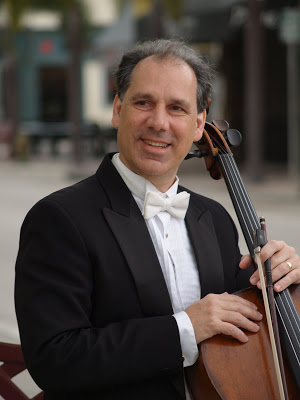Hearing a good chamber music recital in a small room out of season is comforting: While our local world is focusing on other things than the classical realm, it’s heartening to know that fine musicians are still at it, working away and making admirable art.
This past Sunday at the Steinway Piano Gallery in Boca Raton, the Brazilian-born cellist Claudio Jaffe offered his version of a working musician encountered in a time of low spotlights, which for his full-house audience meant a chance to hear an excellent local player in nourishing repertory. Accompanied by Lynn Conservatory pianist and teacher Yang Shen, Jaffe, a longtime Palm Beach County resident, played one standard work on his program, another for an encore, and three works from the lesser-known pages of the canon.
The standard work was the Sonata in A minor, D. 821, of Franz Schubert, known as the Arpeggione because it was originally written for that instrument; Jaffe provided a useful description of the short-lived “guitar violoncello” in remarks before playing the piece. As he mentioned, the guitar range of the obsolete arpeggione means that a translation for cello has the player floating in the stratosphere range for a good portion of the piece.
And Jaffe struggled in the very top of the register to get the notes just right, but this was only a minor detraction from the overall effect of his reading, which was polished and urbane. Even in the more virtuosic works on the program that came later, there was the same sense of control and careful thinking about the effect of what he was playing.
In the beautiful slow movement of the Schubert, Jaffe let the long line of the composer’s melody breathe unbroken, to noble effect, and dispatched the busy writing between the reappearances of the rondo theme with clarity and verve. It was in general a restrained performance of the sonata, but no less effective for that.
The same qualities served Jaffe well in the opening work on the recital, the three Fantasy Pieces, Op. 73, written in 1849 by Robert Schumann. In his playing, listeners could hear the freshness of Schumann’s inspiration in the way Jaffe brought out the melodies with simplicity and strength. There was some compelling fire, too, in the main theme of the third piece, which the cellist attacked with real force.
After the Schubert came a rarely heard work of Dvorak, the Rondo in G minor, Op. 94, which like all of Dvorak’s string writing is wonderfully idiomatic. Jaffe gave nice touches of slightly different color to each repetition of the catchy main theme, at one point stretching out the chromatic turn with which it opens, and at another giving a little extra push to the high G that is the peak of the theme’s first strain.
Despite its structure as an occasional chamber work for cello and piano, the Rondo has plenty of difficult passages, and its affinity with the famous Cello Concerto was clear; Jaffe addressed these more acrobatic challenges nimbly, and made each of Dvorak’s new tunes contrast sharply with the others.
The most exciting playing of the evening came in the final scheduled work, the Hungarian Rhapsody, Op. 68, of the Hungarian cellist-composer David Popper. This is a showoff work, and Jaffe did some of his best work here, building up a ferocious, though tightly controlled, head of steam in the long string of uninterrupted 16th notes that dominate much of the piece.
The audience was riveted by this expertly judged display, particularly when it came around a second time, and gave Jaffe a strong ovation. A piece like this can work only when the cellist is in complete command of the technique needed to bring it off. It should also be noted that the accompanist needs to be a good partner with the soloist, and Shen was completely in synch with Jaffe as he launched his scalar barrage; indeed, she proved a deft accompanist throughout the entire program.
For an encore, Jaffe performed the Prelude of the G major Cello Suite (No. 1, BWV 1007) of J.S. Bach. After the fireworks of the Popper, this lovely, classic composition sounded quite demure, and a more aggressive approach might have been just as good as the one Jaffe chose: taste, precision and elegance.
The next concert in the Piano Lovers series at the Steinway Gallery will feature Yang Shen in a solo recital Aug. 30. Scheduled so far are two works of Schumann — the early Abegg Variations, Op. 1, and the epic Fantasy in C. Op. 17. Tickets are $20 in advance, $25 at the door, for the 5 p.m. concert. Call 929-6633 or visit www.pianolovers.org.
